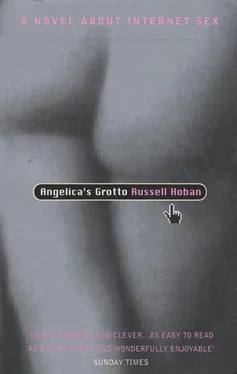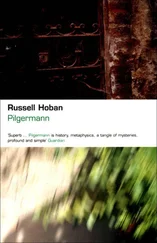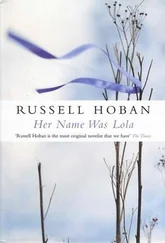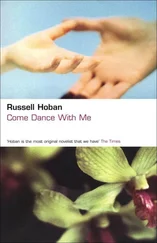‘Certainly, but it’s got to be tonight. While you’re thinking we can have a drink. What’s your pleasure?’
‘Whisky.’
He poured a large Glenfiddich for both of them and raised his glass to her. ‘Happy days, Melissa.’
‘Whatever you say, Prof.’ She closed her eyes and retired into a reverie while the frost did its nightly sparkle on the parked cars under the pinky-yellow lamps. Both glasses became empty quickly and Klein refilled them.
After a while Leslie’s feet were heard on the outside stairs and he came in by the basement door. ‘Honey, I’m home,’ he said, and unslung his sports bag from his shoulder.
‘We’ve done that one,’ said Melissa.
‘But not this one,’ said Leslie. He put his hand between her legs and kissed her wetly.
Are you just going to keep taking this shit? said Oannes.
I’m thinking about it, said Klein. To Leslie, ‘How was your day at the office?’
‘Hard, which is how they want it,’ said Leslie. ‘And how was yours? Did you write lots of exciting words?’
‘Not really.’
Well? said Oannes. Cowardice is OK but this is your turf.
‘Good-looking salad,’ said Leslie. ‘You do that all by yourself, Prof?’
‘Don’t call me Prof.’
‘Oh yes, I forgot. I’ll try not to let it happen again.’ He poured a Glenfiddich for himself and raised his glass to Klein. ‘Here’s to the world of the arts,’ he said. He downed the whisky, poured another, set the glass on the drainingboard, opened the fridge, took out the vegetables, got a large knife and a bowl, and began to make coleslaw. ‘We wrapped up Dickerydoo today,’ he said to Melissa, ‘so I’ll be able to give you more time.’
‘Right,’ she said to his back. Looking at Klein, she shrugged.
Leslie was graceful and efficient. As he laid out what he needed without apparent thought he made a tidy little still life, then he peeled off the outer leaves of the cabbage, quartered it with professional speed, picked up the slicer, and sliced the cabbage into a bowl. He cleaned and grated the carrots, peeled a large onion and chopped it up fine, peeled and chopped an apple in, added some chopped parsley, black pepper, a pinch of salt, a dash of vinegar, then stirred in yoghurt and mayonnaise and a pinch of sugar. Everything he did was pleasing to the eye; his touch was deft and sensitive and his hands performed as stylishly as those of a TV chef. Melissa noticed Klein watching him. ‘He’s good at what he does,’ she said.
‘You know it,’ said Leslie.
While Leslie was occupied with the coleslaw Melissa caught Klein’s eye and looked towards the stairs. ‘Right,’ he said, ‘I’m going up to the word machine. Give me a shout when it’s eating time.’
‘You got it, Mr Harold, sir,’ said Leslie.
Once at his desk, Klein put up on the screen the page he called NEXT, and sat looking at Jimmy Durante’s words:
Sometimes I think I wanna go,
And then again I think I wanna stay.
‘No Klimt today,’ he said. ‘The Klimt is off. We can recommend … What?’ He’d always tried to have a new project in mind to follow whatever he was working on — something to look forward to, but now he could think of nothing but Melissa and the conversation she was having with Leslie at this moment. He heard no raised voices from the kitchen but he wanted to make a little space around himself with music, so he put on the Charlie Byrd Trio with Ken Peplowski, The Bossa Nova Years. The songs of Antonio Carlos Jobim, instead of being soothing, seemed to be getting between him and something he wanted to look at. Or was it something that wanted to look at him? The Knochenmann with the red sceptre, was it, offering the next project?
He went to the window, looked at the frost-sparkling cars, thought of the seasons revolving inexorably while metal rusted and flesh decayed, thought of the trees across the common, now bare, how in the summer dawns they swayed their leafy tops in the early breeze, indifferent to humans who slept and woke and slept again.
From the trees on the common his mind went to the olive tree on Paxos, the olive tree he had drawn when Mrs Lichtheim tested him. He saw the flash of silver as the summer wind stirred its leaves; he stood under it in the green-lit shade of the olive grove and looked at the ancient wrinkled trunk that was not dead and the dark opening out of which the naked Persephone had stepped, her body pale as moonlight, her face shadowed by her hair.
He was holding the Paxos stone, round and heavy, in his right hand, feeling in it the lapping of the sea on the pebbled strand, the flat blue of the sky, the Ionian sunlight. He read the Greek words he’d written on it, KINESIS/ ANAPAUSIS: MOTION/REST, and tried to recall the balance of the moment when he had written them, tried to hear Hannelore’s voice, tried to feel her body under his hand, felt instead the warm and pitted stone. What was his motion, where was his rest?
Leslie was standing in front of the desk with his back to the Meissen girl and the wall where Pegase Noir had hung. He had his drink in his hand and a reckless smile on his face.
‘What?’ said Klein.
‘You the cool one, ain’t you, Prof,’ said Leslie. ‘You the man with the plan — get us both moved in here and then throw my black ass out in the street and gobble that Melissa pussy night and day. Oh yes, you the man.’
Klein was looking at Leslie but he saw beyond him, on the blank wall, Lucifer rising out of the inkblot, transcendent, pale green and high above him. ‘I didn’t have a plan,’ he said, ‘but I want you out.’
‘You want, Prof? Lemme tell you something, old numb-nuts …’ He reached behind him to put his drink on the mantelpiece and knocked over the Meissen girl. The porcelain figure fell to the hearth and shattered, and in that same moment the Paxos stone appeared in the middle of Leslie’s forehead with blood streaming from it.
Leslie disappeared from view. ‘O God!’ said Klein. ‘What have I done?’ He stood up, peered over the edge of the desk, and saw Leslie lying on the floor, his face and chest covered with blood. He looked down at his right hand that had held the stone and saw that it was empty. He was breathless, the usual leadenness was travelling down his left arm and he felt as if a heavy fist had punched him in the heart. He reached for the glyceryl trinitrate, squirted it under his tongue, and waited for things to settle down.
You got the action, said Oannes. You got the motion.
What about rest? said Klein. To Leslie, not visible from where he sat, he said, ‘I’m really sorry! I had no idea …’
Melissa appeared. ‘What happened?’ she said.
‘Up jumped Lucifer,’ said Klein, watching the inkblot soar high above the world into the infinity of the blank wall.
‘What are you talking about? Where’s Leslie?’
Klein pointed. Melissa came round the desk, knelt by Leslie, felt for a pulse. ‘He’s dead, Harold.’
‘I can’t believe that I killed him, it doesn’t seem real.’ His mind was singing:
Pack up all my care and woe,
Here I go, singing low,
Bye-bye, blackbird.
Melissa was looking at the bloody stone and the fragments of porcelain. ‘What happened?’ she said again.
‘He came up here and he was all worked up about whatever you said to him. He was ranting about his black ass being thrown out into the street and he knocked over the Meissen girl and I killed him with the Paxos stone.’
‘Jesus, Harold! You killed him for breaking a porcelain figure?’
‘The stone was in my hand and when I heard the figure shatter my arm went back and suddenly there was the stone in the middle of his forehead. It was nothing I’d intended — it just happened.’
Читать дальше












